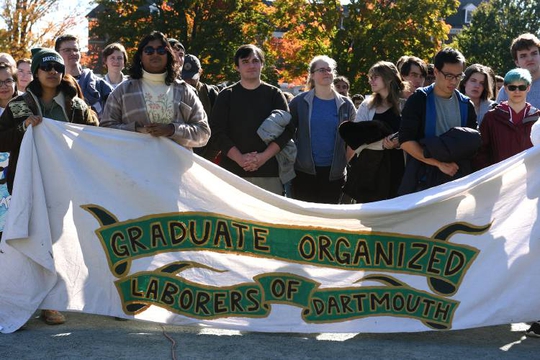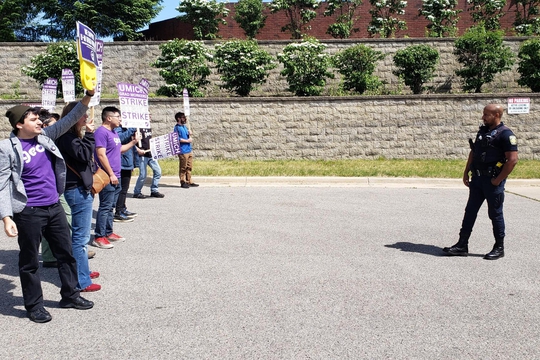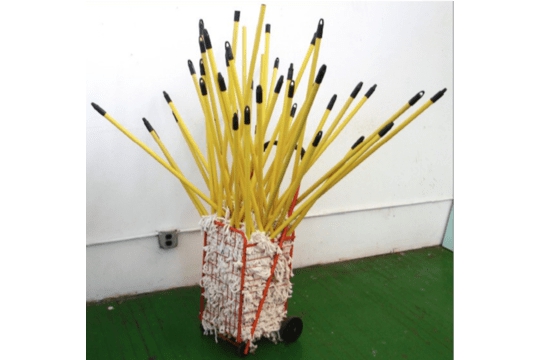Winning a Bargaining Unit for All Graduate Workers
by
Logan E. Mann
July 3, 2023
Featured in Correspondences from the Upsurge (Book)
Reflections from a Dartmouth Graduate Worker on a successful campaign to broaden the category of Graduate Worker in the union’s recognition contract.

inquiry
Winning a Bargaining Unit for All Graduate Workers
by
Logan E. Mann
/
July 3, 2023
in
Correspondences from the Upsurge
(Book)
Reflections from a Dartmouth Graduate Worker on a successful campaign to broaden the category of Graduate Worker in the union’s recognition contract.
On April 3rd, 8 days before our recognition election, Dartmouth’s legal team informed us that they would challenge the ballots of around 50% of our eligible voters, on the grounds that “graduate fellows” are not employees of the university. In a National Labor Relations Board (NLRB) election, if the number of challenged ballots is determinative to the outcome (greater than the margin of the vote), the employer and the union must litigate each ballot individually at the NLRB regional office. Dartmouth’s intentions were clear: challenge hundreds of ballots and initiate a protracted legal battle which would delay certification of our union for years, icing us out indefinitely in the hope that we either lose all momentum or lose collective bargaining rights altogether under a future Republican administration.
The definition of a Graduate Fellow in our case was quite murky. Fellows are often described by universities as graduate students who receive stipend compensation solely to support their academic pursuits, rather than as compensation for employment. However, the distinction between fellows and a Research Assistants (RAs) is typically one without a difference. Grad Fellows and RAs work in the same labs, under the management of the same faculty advisors, with the same job responsibilities and the same precarity. In fact, Dartmouth – which is hilariously inept at keeping track of funding sources and job titles – has historically never made this distinction. They eventually provided us and the NLRB with their updated list of voters. This list seemed to have selected around 50% of us to exclude at random, with no coherent pattern or internally self-consistent logic to these exclusions. Bizarrely, most Graduate Instructors were on their exclude list (asserting that even their instructors do not work for them), while many recipients on actual fellowships were not. We suspect that the list was thrown together at the last minute by overworked administrators. We speculated that their definition of a Fellow likely came from throwing darts at the list of grad student workers while blindfolded. By taking this step, Dartmouth displayed their clear contempt for academic labor, by asserting that academic work is not real work.
This move was not necessarily a surprise to us. It came in the wake of a similar – and for now successful – move at MIT to exclude grad Fellows. Instead, we were more caught off guard by the timing of this move. We always expected Dartmouth – which shares a law firm with MIT – to challenge the eligibility of Fellows at some point. We already discussed at length how to respond if Fellows were challenged ahead of an election. The issue was a red line for us, and we were prepared for a fight. We understood that if we abandoned the Fellows in our unit, we would be giving Dartmouth free reign to exclude workers from contracts at will, construct nightmarish tiered pay structures, and erode our collective militancy to the point of collapse. We felt well prepared to fight this fight, but we expected to fight it before rather than during the election itself.
Instead of despairing at Dartmouth’s attempts to turn our election into a farce, we recognised a critical flaw in their strategy. By choosing to challenge each Fellow individually, they effectively waived their opportunity to challenge their status as a group. We realised that the question of the Fellows would be moot, if we did not give them any Fellows to challenge. So, we changed our approach. Instead of turning out all of our members to vote, we settled on a strategy of getting the so-called Fellows to boycott the vote. This was the opposite of a typical election strategy – and to my knowledge completely unprecedented in a recognition election. Over the course of the week, we reached out to nearly every graduate student worker, informed them of their status, and directed them to either vote or to walk out and attend a rally outside the administration building. There, they signed their names to a symbolic ballot and delivered it to the president’s office (he wasn’t in at the time).
On April 12th, we won our election with an 89% majority and only 8 challenged ballots. This means that Fellows are now fully and unambiguously represented in the bargaining unit, and Dartmouth has no opportunity to challenge their status.
Throughout this experience, we learned some important lessons. Primarily that academic workers should never wait for the legal landscape to change before taking action. The NLRB has and will continue to grant and then revoke labor rights from academic workers for the foreseeable future. Most recently, NLRB Region 1 ruled in favor of MIT, stripping labour rights from Graduate Fellows. That ruling will need to be appealed before taking force nationally, but it poses a major threat to private sector grad student unions going forward. Duke University is currently challenging the 2016 NLRB decision that most recently granted labour rights to graduate students. For the foreseeable future, labour law will be an extremely unreliable tool to bring private universities to the table, and we may soon all have the rug pulled out from under us. If we are not prepared to deal with these eventualities – or if we abandon segments of our membership for temporary expediency – we will collapse under these pressures. To win and protect our labour rights in a way that is stable and lasting, we must act from a position of self-confidence and assert that we fundamentally have everything we need, because we are organised, militant, and ready to struggle against the university.
Featured in Correspondences from the Upsurge (Book)
author
Logan E. Mann
Subscribe to Notes from Below
Subscribe now to Notes from Below, and get our print issues sent to your front door three times a year. For every subscriber, we’re also able to print a load of free copies to hand out in workplaces, neighbourhoods, prisons and picket lines. Can you subscribe now and support us in spreading Marxist ideas in the workplace?
Read next

Reflections on a Teaching Assistant Strike
by
Michael Mueller,
Lucy Peterson
/
July 3, 2023

